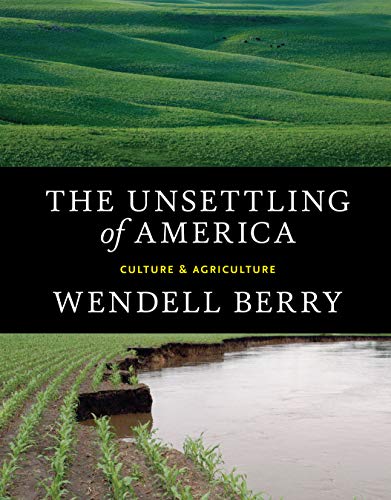Does a Washing Machine Steal My Dignity?
Wendell Berry, American philosopher and writer, is well known for his focus on conservation, not only of land but of human traditions. He sought in his writing to point out the destruction of small, interdependent farming communities and the disappearance of the jack-of-all-trades in favor of specialists who can only do the one thing in which they specialize. His particular foe, it seems at times, is the modern machine (symbol of Agribusiness). The machine takes the place of many workers, and, he claims, takes the dignity of work away from the remaining workers. So how did he apply some of these concepts to housewives? Further, was Wendell Berry right about housewives? Let’s take a look at some statements from The Unsettling of America, which I believe overall to be a beautifully-written call to think beyond the obvious claims of our culture to success.
Wendell Berry’s Writings about the Role of Housewives
 In the chapter-essay entitled, “The Body and the Earth,” Berry describes the gradual process moving men from workplaces directly below their homes (e.g. a general store) or around their homes (a farm) into workplaces that paid them only in money. They then passed the money to their wives, who now became the sole provisioners of the family. Wives planned the meals, purchased the food, and cooked it. As men stopped nurturing the plants of the field, they determined that “nurturing should become exclusively a concern of women [serving] to signify to both sexes that neither nurture nor womanhood was very important” (118). *
In the chapter-essay entitled, “The Body and the Earth,” Berry describes the gradual process moving men from workplaces directly below their homes (e.g. a general store) or around their homes (a farm) into workplaces that paid them only in money. They then passed the money to their wives, who now became the sole provisioners of the family. Wives planned the meals, purchased the food, and cooked it. As men stopped nurturing the plants of the field, they determined that “nurturing should become exclusively a concern of women [serving] to signify to both sexes that neither nurture nor womanhood was very important” (118). *
Berry points out that when women obtained more free time and more control of money, they became greater targets for salesmen, who tried to tell them what they needed to be and look like in order to keep their husband’s interest.
“Identified by What They Bought Rather than What They Did”
“Motivated no longer by practical needs, but by loneliness and fear, women began to identify themselves by what they bought rather than by what they did. They bought labor-saving devices which worked, as most modern machines have tended to work, to devalue or replace the skills of those who used them. They bought manufactured foods, which did likewise. They bought any product that offered to lighten the burdens of housework, to be “kind to the hands,” or to endear one to one’s husband. And they furnished their houses, as they made up their faces and selected their clothes, neither by custom nor invention, but by the suggestion of articles and advertisements…Thus housewifery, once a complex discipline acknowledged to be one of the bases of culture and economy, was reduced to the exercise of purchasing power…As housekeeping became simpler and easier, it also became more boring. A woman’s work became less accomplished and less satisfying. It became easier for her to believe that what she did was not important. And this heightened her anxiety and made her even more avid and even less discriminating as a consumer…”(119).
About marriage, he continues: “Without the household—not just as a unifying ideal, but as a practical circumstance of mutual dependence and obligation, requiring skill, moral discipline, and work—husband and wife find it less and less possible to imagine and enact their marriage. Without much in particular that they can do for each other, they have a scarcity of practical reasons to be together…” (121). From here, he moves on to his ideas about fidelity and fertility.
Was Wendell Berry Right?
So was Wendell Berry right here? Are women who choose to stay at home bored? Are the labor-saving devices that our homes are now filled with actually curses rather than blessings, in that they make us believe that our work isn’t important? Do we seek satisfaction in what we buy rather than what we do?
Obviously, it depends on the woman. (I do believe that Berry realized this and was simply generalizing to make a point, but let’s think through this!) We are all different, and how we use our time at home varies greatly according to our interests, our ethics, and our priorities. Yes, I’m sure housewives exist who drop their kids off at school and then spend the day shopping rather than working. (Berry would likely describe this as consuming versus producing.) Yet there are still many women who use their position at home to be guardians of culture—their own home-culture and also their nation-and-world culture.
My Life with Modern Conveniences
I am a young-ish mother who has decided to stop teaching outside the home and work within it. A typical day for me involves:
- homeschooling, occasionally with a YouTube video used as illustration
- gardening
- baking bread and cooking other foods from scratch using my electric stove and oven
- cleaning my house with the help of a vacuum cleaner (a constant effort with young children in the home)
- doing laundry mostly by letting my washer and dryer do the labor
- studying the Bible and a multitude of other books, and
- teaching my children how to be good citizens (lessons on sharing, kindness, etc.) My top priority is to teach my children about God’s love and righteousness.
Is What I Do as a Modern Housewife Worthwhile?
While there are moments when I too bow to the prevailing view of our culture that if you do not produce money you produce nothing worthwhile, there are very few moments when I experience boredom. I’m too busy to be bored. And when I stop to think, I realize that there’s nothing more important than the task I’m doing right now. Housework is unpaid in money, but it is richly paid in the love and well-being of my family.
If I had no washing machine, dryer, electric stove, vacuum cleaner, or other modern conveniences, would I then feel more like a skilled worker? Perhaps. But I would also be so tremendously battered by the constant need to keep clothes clean and a fire going that I would have very little time to educate my children (and none at all to further my own education). I know this because I have spent time in countries where I had no washing machine and the stove was heated by an ever-hungry woodfire. Laundry on a washboard was still a simple task for a single woman; for a woman with diapered children, it can become THE great occupation. (As a missionary friend in a remote island nation told us, 80% of one’s life in such conditions is spent providing the very basics of survival.)
Wendell Berry was Right–and He was Wrong
I think Wendell Berry was a brilliant, thought-provoking writer.** He correctly diagnosed our culture’s hard lean toward materialistic consumerism rather than value-centered production. He’s absolutely correct about the inability of purchasing power to create worth. He’s right about the value of working with our hands. I revel in the dignity of labor, of thrusting my hands into the soil as I plant seedlings or of shaping bread rolls with my mother’s passed-on skill. But I do not think a vacuum cleaner and electric washing machine lower my dignity or feelings of worth.
Thoughts? Please email us or let me know in the comments. I welcome your opinions.

*Berry, Wendell. The Unsettling of America: Culture & Agriculture. Reprint, Berkeley, CA, Counterpoint, 2015.
**I plan to spend time reading more of Berry’s work. I love authors like him who “waken” my brain to engage with our world!


 : a favorite place to walk when we can!
Once
: a favorite place to walk when we can!
Once 
![The first photos are of my parents’ sprawling rural Arkansas garden. The last is of my tiny little beds in the big city. Plants bring life to even the smallest corner!
I’ve been reading some beautiful fiction this year, and I just posted a review of a book by one of my favorite authors, Leif Enger. (https://therestfulhome.com/brave-young-handsome-review/ in your browser, or click on the link in my Instagram profile) If you don’t have time to read the book, though, here’s just a quote or two for your enjoyment:
🎼
“Death arrived easy as the train; [he] just climbed aboard, like the capable traveler he was.”
🛤️
On riding a horse: “You are a feeble and tenuous being; the only thing a horse wants from you is your absence.” 🐎 😄
#quotes #leifenger #amreading #gardens #gardening](https://scontent-atl3-1.cdninstagram.com/v/t39.30808-6/468657020_18342474787176025_4442629541396867851_n.jpg?_nc_cat=108&ccb=1-7&_nc_sid=18de74&_nc_ohc=DEja6UP2ct4Q7kNvgEYJxCM&_nc_zt=23&_nc_ht=scontent-atl3-1.cdninstagram.com&edm=ANo9K5cEAAAA&_nc_gid=AA4bBsvQ_JpqZXLUPUTpTC8&oh=00_AYCjI9LUx-cJxe6cu0n7H1Gounaz92aBlTrQacnKut8umg&oe=67567CAB)
















